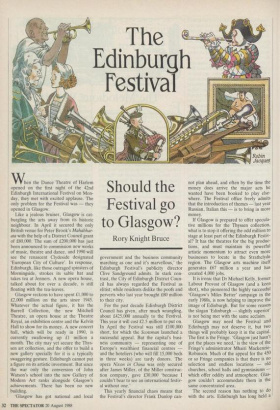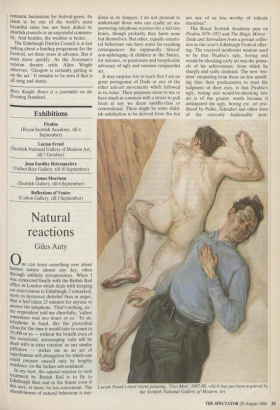The @- Edinburgh Festival
Should the Festival go to Glasgow?
Rory Knight Bruce
hen the Dance Theatre of Harlem opened on the first night of the 42nd Edinburgh International Festival on Mon- day, they met with excited applause. The only problem for the Festival was — they opened in Glasgow.
Like a jealous bruiser, Glasgow is cat- burgling the arts away from its historic neighbour. In April it secured the only British venue for Peter Brook's Mahabhar- ata with the help of a District Council grant of £80,000. The sum of £200,000 has just been announced to commission new works of music, theatre and dance, and 1990 will see the renascent Clydeside designated 'European City of Culture'. In response, Edinburgh, like those outraged spinsters of Morningside, strokes its sable hat and takes tea at Jenners. A new opera house, talked about for over a decade, is still floating with the tea-leaves.
Glasgow reckons to have spent £1,000 to £2,000 million on the arts since 1945. Whatever the actual figure, it has the Burrell Collection, the new Mitchell Theatre, an opera house at the Theatre Royal, an exhibition centre and the Kelvin Hall to show for its money. A new concert hall, which will be ready in 1990, is currently swallowing up £1 million a month. The city may yet secure the Thys- sen art collection, and the offer to build a new gallery specially for it is a typically swaggering gesture. Edinburgh cannot put a figure on its artistic investment. But since the war only the conversion of John Watson's school into the new Gallery of Modern Art ranks alongside Glasgow's achievements. There has been no new building.
'Glasgow has got national and local government and the business community marching as one and it's marvellous,' the Edinburgh Festival's publicity director Clive Sandground admits. In stark con- trast, the City of Edinburgh District Coun- cil has always regarded the Festival as elitist; while residents dislike the poofs and perverts who last year brought £80 million to their city.
For the past decade Edinburgh District Council has given, after much wrangling, about £425,000 annually to the Festival. This year it will cost £2.5 million to put on. In April the Festival was still £100,000 short, for which the Scotsman launched a successful appeal. But the capital's busi- ness community — representing one of Europe's wealthiest financial centres and the hoteliers (who will fill 15,000 beds in three weeks) are tardy donors. The opera Nixon in China was only secured after James Miller, of the Miller construc- tion company, gave £30,000 'because I couldn't bear to see an international festiv- al without one.'
This yearly financial chaos means that the Festival's director Frank Dunlop can- not plan ahead, and often by the time the money does arrive the major acts he wanted have been booked to play else- where. The Festival office freely admits that the introduction of themes — last year Russian, Italian this — is to bring in more money.
If Glasgow is prepared to offer specula- tive millions for the Thyssen collection, what is to stop it offering the odd million to stage at least part of the Edinburgh Festiv- al? It has the theatres for the big produc- tions, and must maintain its powerful artistic momentum to attract even more businesses to locate in the Strathclyde region. The Glasgow arts machine itself generates £67 million a year and has created 4,000 jobs.
It is ironic that Dr Michael Kelly, former Labour Provost of Glasgow (and a keen shot), who pioneered the highly successful 'Glasgow's Miles Better' campaign in the early 1980s, is now helping to improve the image of Edinburgh. But for some reason the slogan 'Edinburgh — slightly superior' is not being met with the same acclaim. Glasgow may need the Festival and Edinburgh may not deserve it, but two things will probably keep it in the capital. The first is the Fringe. 'Glasgow just hasn't got the places we need,' is the view of the Fringe's administrator Mhairi Mackenzie- Robinson. Much of the appeal for the 450 or so Fringe companies is that there is no selection and endless locations — old churches, school halls and gymnasiums which offer oddity and atmosphere. Glas- gow couldn't accommodate them in the same concentrated area.
The second reason has nothing to do with the arts. Edinburgh has long held a romantic fascination for festival-goers. Its claim to be one of the world's most beautiful cities has not been dulled by churlish councils or an ungrateful commun- ity. And besides, the weather is better.
The Edinburgh District Council is at last talking about a funding programme for the Festival, set three years in advance. But it must move quickly. As the Scotsman's veteran theatre critic Allen Wright observes, 'Glasgow is certainly getting in on the act.' It remains to be seen if that is all song and dance.
Rory Knight Bruce is a journalist on the Evening Standard.























































 Previous page
Previous page